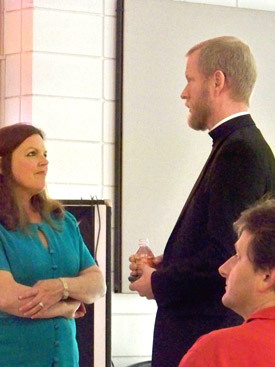
ROGERS -- Father Tadeusz "Tad" Pacholczyk, director of education at the National Catholic Bioethics Center in Philadelphia, addressed critical questions in his presentation "Beginning and End-of-Life Issues," sponsored by Northwest Arkansas Catholic Respect Life Council and St. Vincent de Paul Church April 11-12.
Speaking to an audience of about 80 people in the church hall, Father Pacholczyk centered the April 11 presentation around beginning-of-life issues, mainly in vitro fertilization procedures and the technology.
"Our technology is outstripping our moral standards. Just because we can, should we?" he said.
"Thirty years ago, no one had any idea that one day we would be using this technology. No one imagined this would be possible. IVF, the familiar term for this procedure, is the best example of the proverbial 'slippery slope' in understanding our moral standards."
In addition to IVF, Father Pacholczyk discussed other procedures used when women are seeking to get pregnant. For example, preimplantation genetic diagnosis, or PGD, is described as a eugenic maneuver and "a process to create designer babies such as the selection of the sex of a child."
"This rapidly increasing technology is a result of customer demand," he said.
In his objections to IVF, Father Pacholczyk said the frozen embryos resulting from these procedures are an additional problem.
"At the moment there are some 500,000 frozen embryos, and we are making more each day," he said.
Germany and Italy have both established laws that limit the number of embryos used. In Italy only a maximum of three embryos can be used and all must be implanted in the mother at the time of the procedure.
With the implantation of multiple embryos, there are an increasing number of multiples being born, many of them prematurely. Unfortunately, this increases the chances of birth defects, such as eye and ear problems as well as learning disabilities.
In discussing the moral and ethical difficulties with IVF, Father Pacholczyk said more priests need to address this issue in homilies.
"This is often difficult because of the technical nature of the subject and the various ages in the audiences," he said. "But the purpose of preaching on this issue is to raise awareness. Catholics need to know that this is a Catholic issue. Human life and procreation go hand in hand."
At the same time, he said the desire for a couple to have children is a strong and natural inclination.
"The intention of the couple desiring children is a good thing," he said. "Babies are a natural magnet for us. A child is always a gift. But not every good goal will justify the means. In these situations, we are reminded as Catholics to show greater sensitivity for these families experiencing infertility and to call them to a higher standard."
On the following evening, Father Pacholczyk addressed an audience of about 75 people on end-of-life issues.
In providing an overview of examples of the common terms, "ordinary" and "extraordinary" means in the use of life-sustaining procedures, he said these kinds of decisions require a complex blend of factors in making this kind of judgment.
"We must make a good prudential judgment to fulfill our duty in dealing with end-of-life issues," he said.
For those in the audience who might face helping someone at the end of his or her life, he emphasized that compassion is part of the journey by its own definition -- "to suffer with." The journey also encompasses the circle of life around the patient -- the family, clergy, physicians and society in general.
Father Pacholczyk said Catholics can influence society, whether it is at the beginning or end of life.
"As Catholics we bring our faith to the marketplace, working in secular environments such as hospitals," he said. "Our faith can change that environment around us. Significant differences require more dialogue. We must be willing to engage in active exchanges verbally to make progress."
Sheila Pursell, president of the Northwest Arkansas Catholic Respect Life Council, said, "A person with his academic brilliance could have easily talked over our heads; however, using human and personal examples, he put things in a way that was both thought provoking and easy to apply to the average individual's situation. I was touched by what a compassionate and humble priest he is."
Stan Gurski said, "End of life is not something a young person gives much thought to, but we all find ourselves in the position of administering care to a loved one, a spouse, parent or family member at some time during life's journey."
For Tom Rohr, Father Pacholczyk's presentation "demonstrated total continuity of faith and science. Many people feel that faith and science cannot mix. Father Tad showed us not only do they mix but in order to have good science, faith must be applied."
Please read our Comments Policy before posting.
Article comments powered by Disqus Diocesan staff analyze ‘Dignitas Infinita’ declaration
Diocesan staff analyze ‘Dignitas Infinita’ declaration
 St. Bernard expands clinic to help more moms
St. Bernard expands clinic to help more moms
 Paragould couple retires after 40 years in ministry
Paragould couple retires after 40 years in ministry
 Fort Smith church raising $2.5 million for security
Fort Smith church raising $2.5 million for security
 MSM senior an all-around winner in classroom and track
MSM senior an all-around winner in classroom and track
 I knew in fifth grade Jesus was my best friend
I knew in fifth grade Jesus was my best friend
 St. Joseph a model of solidarity with immigrants
St. Joseph a model of solidarity with immigrants
 Two gifts after Jesus’ death: Virgin Mary and Eucharist
Two gifts after Jesus’ death: Virgin Mary and Eucharist
 Why we have an altar, and not just a communion table
Why we have an altar, and not just a communion table
 Pope: Wars should be resolved through nonviolence
Pope: Wars should be resolved through nonviolence